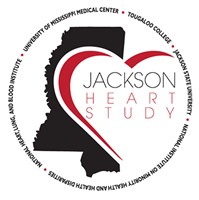
Heart disease affects African Americans at a higher rate and at younger ages than in other racial and ethnic groups. The Jackson Heart Study (JHS), initiated in 1998, is the largest study of risk factors associated with this health disparity. In addition, the JHS offers community education and outreach activities to promote healthy lifestyles and reduce disease risk burden, and it is preparing the next generation of researchers by providing undergraduate- and graduate-level training, as well as high school science and math enrichment programs to support and encourage students to pursue biomedical careers.
Study Objectives
The primary objective of the JHS is to investigate the causes of heart disease in African Americans and learn how to best prevent this group of diseases in the future. More specific objectives of this study are to
- Identify factors that influence the development and worsening of heart disease in African Americans, with an emphasis on clinical signs related to high blood pressure, such as structural heart changes, heart failure, stroke, and disorders affecting the blood vessels of the kidneys.
- Build research capabilities in institutions at the undergraduate and graduate level by developing partnerships and enhancing participation of researchers in large-scale epidemiological studies.
- Attract students to and prepare them for careers in the health sciences.
Data Collection and Key Players
Study participants include 5,306 African American men and women living in the Jackson, Mississippi, metropolitan area, which consists of Hinds, Madison, and Rankin counties. Most participants are 35 to 84 years old, although within family subgroups, some are as young as 20 years old. Researchers collected DNA samples from 4,726 consenting JHS participants and prepared frozen-preserved samples from approximately 1,500 JHS Family Study participants. Whole genome sequencing was completed on 3,418 participants to study inherited risk factors for heart, lung, and blood disorders.
JHS participants have undergone multiple clinical tests to provide data on heart imaging, as well as submitting DNA, blood, urine, and other samples that could provide biomarkers. The participants are contacted by telephone each year to update their personal and health information, including reporting on medical events or hospitalizations, functional status, and sociocultural information. Records of heart-related events and deaths are obtained from hospitals and the National Death Index. Research through 2024 will also look at the links between heart health and brain health.
The JHS is supported by the National Heart, Lung, and Blood Institute (NHLBI) and NIMHD. It is conducted in collaboration with Jackson State University, Tougaloo College, the Mississippi State Department of Health, and the University of Mississippi Medical Center.
Study Significance
The JHS serves as a resource to the scientific community for novel research, promotes heart health in the local community, and encourages students to pursue biomedical careers. Long-term research may help explain the higher rate of heart disease among African Americans and uncover new approaches to reduce this health disparity.
Publications
Page updated Mar. 21, 2025

